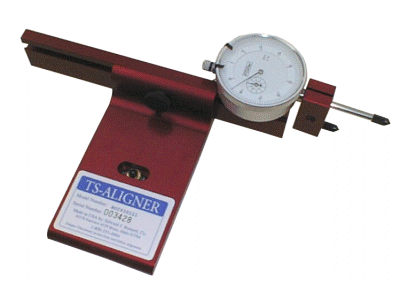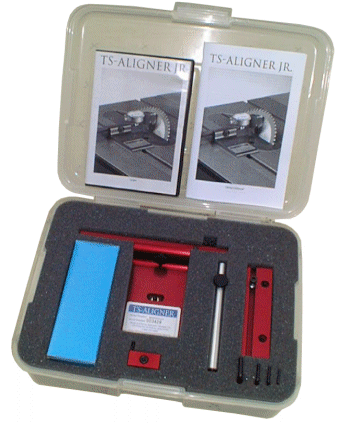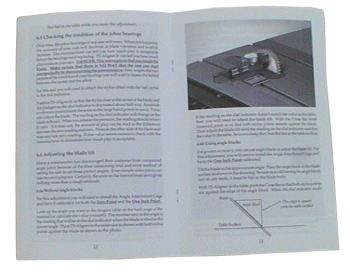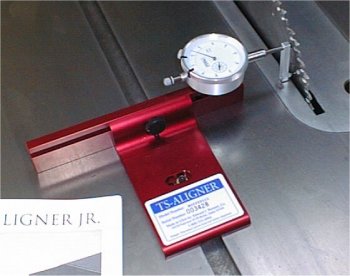|
|
|
| Description The TS-Aligner Jr is an alignment jig optimized to be used on several different woodworking tools. The tool consists of three main elements, a base, an arm, and a dial indicator. These elements along with some other items in the kit allow the tool to be quickly assembled in several different configurations to suit a particular alignment need. For the most part, the tool is constructed of extruded, anodized aluminum which has several important surfaces milled for accuracy. The TS-Aligner Jr comes packed in a clear fitted case which is great for keeping the tool protected in the shop environment. The TS-Aligner Jr is the middle one of three alignment devices sold by the company. |
 |
| I want to make it clear in the beginning of this review that it isn't a requirement to use a sophisticated tool such as this or even a dial indicator to properly align woodworking machines. However, the use of this tool in particular and dial indicators in general allows alignments to be made much more conveniently and if it's convenient, it's more like to be done. The great thing about using dial indicators as opposed to some other method is that they allow the user to read quantitative deviations either in the positive or negative direction. This alone makes the alignment process easier. | |
 |
In Use I can't cover all the uses of the TS-Aligner Jr in this review because it is such a general purpose tool; one could literally write a book on its use. I'll focus instead on its use with the tablesaw since this involves several perpendicular and parallel checks that will be used with other types of machines. The jig does require an alignment itself in order to read most accurately. An alignment is performed at the factory with the dial indicator supplied. If this indicator is swapped out, the alignment would need to be performed again. The alignment is fairly simple to do but does require some iteration. The DVD shows how to do this in pretty clear terms, the manual is less clear. One of the key features of the TS-Aligner Jr is the stylus offset tip. This is a special tip that allows the indicator to read surfaces further out of plane to the plunger. Without this device, one does not (for example) get very much of a reference when measuring against a saw blade. This is a common shortcoming of other dial indicator measurement jigs including those you may make yourself. With the offset tip, the dial indicator can read much closer to the reference plane (in this case a saw table) or along a reference square. |
| For many tablesaw alignments, the jig rides in a miter slot. To
make the measurements accurate, the jig uses three ball bearing assemblies attached to the
bottom of the jig. The center bearing is adjustable to eliminate slop. This is just one of
the great ideas of the device; it's a very good way of allowing the necessary movement but
without allowing any slop which would affect the measurement. This jig can be used along
the entire length of the miter gauge slot minus the length of the jig base. Using the jig
in a tablesaw miter gauge slot, one can easily make checks for blade to slot, and slot to
rip fence alignments. Using other techniques, miter gauge angle alignments, arbor and
blade run-out measurements can be made as well. Note: The bearings on the bottom of
the jig can be removed when required. The Cross Bar knob
should be tightened after placing the jig on the machine, this is so that the bar
will "float" to the correct position for more precise measurements. The
bar is attached to the base somewhat loosely. This is an important consideration for
operation but when the jig is picked up the arm may be loose enough that it will swing
unexpectantly out of position. What this boils down to is that you have to pay
attention when the jig is picked up. The company also carries a line of alignment accessories One of these is an tool that can be used in conjunction with the TS-Aligner Jr for checking the alignment of a radial arm saw. There are also precision squares and angle blocks. At 1/4", these are thicker than typical; the thickness is rather important when you need to run a dial indicator along one of these edges. I would highly recommend to any owner one of the 45 degree squares. The 90 degree squares are also handy. The 6.5 inch square is a good size for general machine work, a longer square would be useful on occasion as well. |
| Support
One cannot use a tool, particularly a measurement tool, to its full potential without either experience or instruction. The TS-Aligner Jr is supported by a decent manual and exceptional DVD. The manual is 44 pages in length and shows how to use the jig for several different alignments. The DVD is 54 minutes in length and covers several topics in 15 chapters. Along with some information about how the jig is made and calibrated, several alignment techniques are illustrated on various woodworking machines. In my experience, the DVD is the best I've seen. It clearly demonstrates the topics which is very important due to the technical subject matter. The company also supports the product over the telephone if that is needed. There are several variations of alignment techniques; most of the ones represented in the manual and DVD are the more common ones used. In cases where they aren't, don't fret, the jig can surely be used with your favorite technique. |
 |
 |
Tips There are a few TS-Aligner Jr related tips I can present after using the tool:
|
|
|
| Summary As stated earlier, this type of accessory isn't required to align woodworking machines properly. It will however make the alignment process much easier and therefore much more likely to be done and with greater precision as well. Having a machined and properly referenced platform to hold a dial indicator is key to the quality of this tool. I believe that supporting the owner with excellent usage information is the other half the story though. The DVD is a worthy product in itself; between it and the manual, the use of the TS-Aligner Jr is illustrated in clear, easy to understand terms. If you have been intimidated or confused as to how to perform woodworking machine alignments, the DVD will take much of the mystery and fear out of doing this very important task. The DVD can also be purchased separately for a measly $1.96. If you are interested in this tool or just in general principles of alignment, this would be worth every single penny (and more) to you. The TS-Aligner Jr makes it easy to test the alignment of a wide variety of woodworking machines. The bottom line is that well aligned machines translates directly into higher quality machine operations, less frustration, and less work. This in turn allows the craftsman to focus more on the craft itself and less on the tools of the craft. |
In the interest of full disclosure Edward J. Bennett Company provided this product to facilitate this review.
|